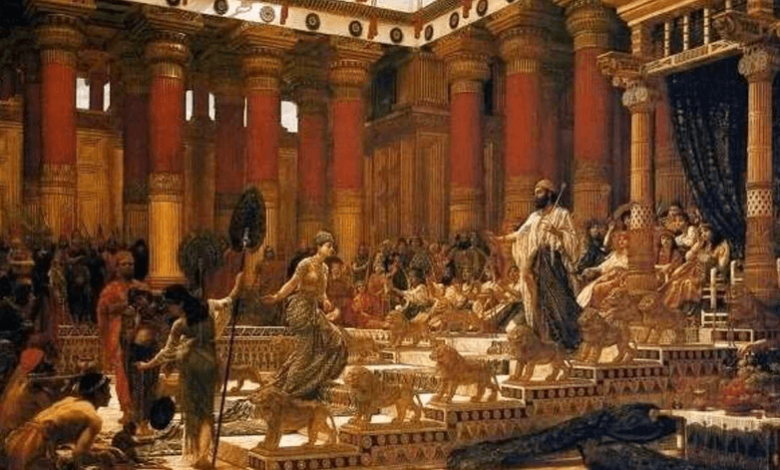King Solomon Net Worth: Biblical King’s Legendary Wealth

King Solomon stands as a towering figure in biblical history, renowned not only for his wisdom but also for his extraordinary wealth. His riches, sourced from vast gold mines, tribute from neighboring kingdoms, and a flourishing trade network, position him as one of the wealthiest individuals of all time. The implications of his affluence extend beyond mere financial metrics, influencing ethical considerations in leadership and governance. Yet, the question remains: what can modern society learn from the complexities of Solomon’s wealth and its impact on his legacy?
Historical Context of Solomon’s Wealth
The wealth of King Solomon, often regarded as a paragon of prosperity in ancient history, can be understood within the broader context of his reign over a united Israel during a period marked by extensive trade, diplomatic alliances, and significant architectural endeavors.
His financial prowess not only underscores the historical significance of his rule but also highlights its lasting cultural impact on subsequent generations and civilizations.
See also: Chante Moore Net Worth: Singer and Actress’ Earnings Breakdown
Sources of Solomon’s Riches
King Solomon’s wealth can be attributed to a multifaceted approach that included strategic trade routes, tribute from vassal states, and the exploitation of natural resources within his realm. Notably, gold mines significantly contributed to his riches, while royal tribute from conquered territories reinforced his financial prowess.
| Source | Contribution |
|---|---|
| Gold Mines | Substantial wealth |
| Royal Tribute | Sustained income |
| Trade Routes | Economic expansion |
Solomon’s Trade and Commerce
Trade and commerce during Solomon’s reign played a pivotal role in amplifying his wealth and influence, as well as fostering economic connections across regions.
His strategic engagement in maritime trade enabled the import of luxury goods such as gold, spices, and textiles, which not only enriched his treasury but also positioned Israel as a central hub in ancient global commerce.
The Temple of Solomon
The Temple of Solomon stands as a testament to ancient architectural ingenuity, reflecting the sophisticated design and engineering capabilities of its time.
Beyond its physical grandeur, the Temple served as a profound symbol of spiritual significance, representing a divine connection and cultural identity for the Israelites.
Analyzing its structural elements and the underlying symbolism provides insight into the socio-religious context of Solomon’s reign and the wealth that facilitated such an endeavor.
Architectural Marvels and Design
Considered one of the most significant architectural achievements of the ancient world, the Temple of Solomon exemplified a confluence of religious devotion and sophisticated engineering.
Its architectural innovations, such as intricate stonework and advanced structural techniques, showcased design influences from diverse cultures.
This synthesis not only facilitated its grandeur but also established a template for future religious structures, reflecting the era’s aspirations for spiritual significance.
Symbolism and Spiritual Significance
Embodying the intersection of divine authority and cultural identity, the Temple of Solomon served not only as a house of worship but also as a symbol of Israel’s covenant with God, reflecting the theological underpinnings of ancient Hebrew society. Its design and purpose exemplified divine abundance and spiritual stewardship, reinforcing the community’s commitment to sacred principles.
| Aspect | Significance |
|---|---|
| Architectural Design | Reflection of divine order |
| Ritual Practices | Expression of spiritual stewardship |
| Wealth and Resources | Symbol of divine abundance |
| Community Identity | Unification of cultural values |
| Historical Legacy | Foundation for future worship |
Wealth in Biblical Texts
Wealth in biblical texts often serves as a multifaceted symbol, representing not only material abundance but also divine favor and moral responsibility within the context of faith and governance.
This duality highlights the interplay between biblical prosperity and spiritual abundance, suggesting that true wealth transcends mere possessions, encompassing ethical stewardship and the pursuit of a righteous life aligned with divine principles.
Comparisons to Modern Wealth
The wealth attributed to King Solomon, often described in biblical accounts, invites intriguing comparisons to contemporary financial figures.
By examining historical estimates alongside inflation-adjusted values, one can contextualize Solomon’s riches within the framework of today’s celebrity wealth.
Such analysis not only highlights the vast economic differences across eras but also prompts a reevaluation of wealth’s meaning and impact in both ancient and modern societies.
Historical Wealth Estimates
Estimates of King Solomon’s wealth, often characterized by extravagant descriptions in biblical texts, invite comparisons to the financial empires of contemporary billionaires, highlighting the dramatic shifts in economic scales and values over millennia.
However, historical inaccuracies complicate these comparisons, as wealth disparities between ancient empires and modern economies challenge our understanding of financial magnitude and societal structure throughout history.
Inflation-Adjusted Comparisons
Adjusting King Solomon’s legendary wealth for inflation reveals a staggering figure that invites intriguing comparisons with the fortunes of today’s most affluent individuals, prompting a reevaluation of economic value across different eras. The inflation impact profoundly alters wealth measurement, illustrating how historical riches can be contextualized within contemporary frameworks.
| Individual | Estimated Wealth (Inflation-Adjusted) | Era |
|---|---|---|
| King Solomon | $2 trillion | 970-931 BC |
| Jeff Bezos | $200 billion | 2023 |
| Elon Musk | $230 billion | 2023 |
| Augustus Caesar | $4.6 trillion | 27 BC – 14 AD |
| Mansa Musa | $400 billion | 14th Century |
Celebrity Wealth Today
Celebrity wealth today represents not only individual financial success but also the broader economic landscape, reflecting trends in technology, entertainment, and social media that have reshaped the metrics of affluence in contemporary society.
With strategic celebrity endorsements and innovative wealth management, modern celebrities navigate complex financial ecosystems.
This highlights the interplay between personal branding and economic influence, ultimately redefining traditional notions of wealth accumulation.
Lessons From Solomon’s Prosperity
Examining the factors that contributed to Solomon’s prosperity reveals enduring lessons on wealth management, governance, and the importance of wisdom in decision-making.
His application of wisdom principles not only fostered economic growth but also ensured sustainable practices.
The Legacy of Solomon’s Wealth
The legacy of Solomon’s wealth extends beyond mere financial metrics, encompassing profound insights into governance, ethical leadership, and the sustainable practices that continue to influence contemporary economic thought. Solomon’s generosity fostered a culture of sharing resources, which catalyzed significant economic impact. The following table summarizes the enduring principles derived from Solomon’s approach to wealth and governance.
| Principle | Description |
|---|---|
| Generosity | Sharing wealth to uplift others |
| Ethical Leadership | Guiding with integrity and vision |
| Sustainable Practices | Long-term resource management |
| Economic Diversity | Encouraging varied economic activities |
| Community Engagement | Involving citizens in decision-making |
Conclusion
The wealth of King Solomon, often likened to Midas’s golden touch, transcends mere numerical estimates, embodying profound implications for leadership and governance.
His prosperity, steeped in historical and biblical significance, serves as a cautionary tale against the pitfalls of excess while simultaneously inspiring aspirations for ethical stewardship.
As modern society grapples with challenges of wealth disparity, the lessons drawn from Solomon’s legacy remain pertinent, illuminating the path toward sustainable and equitable resource management in contemporary contexts.




